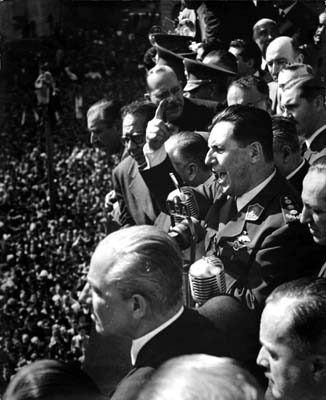WikipediaExtracts:Peronism
Extracted from Wikipedia --
Peronism, also known as justicialism, is an Argentine ideology and political movement with a left-wing tendency, based on the ideas, doctrine, and legacy of Juan Perón (1895–1974). It has been an influential movement in 20th- and 21st-century Argentine politics. Since 1946, Peronists have won 10 out of the 14 presidential elections in which they have been allowed to run. Peronism is defined through its three flags: "social justice" (the fight against social and economic inequalities), "economic independence" (an economy that does not depend on other countries, by developing its national industry), and "political sovereignty" (the non-interference of foreign powers in domestic affairs).
Peronism, as an ideology, is described as a social form of nationalism, as it promotes a sense of national pride among Argentines. However, it promotes an inclusive form of nationalism that embraces all ethnicities and races as integral parts of the nation, distinguishing it from racial or chauvinistic ethno-nationalism that prioritizes a single ethnic group. This is due to the ethnically heterogeneous background of Argentina, which is a result of the mixing between indigenous peoples, Criollos, various immigrant groups, and their descendants. Likewise, Peronism is generally considered populist, as it relies on the figure of a leader (originally embodied by Perón) to lead the masses. Consequently, it adopted a third position in the context of the Cold War, as expressed in the phrase: "we are neither Yankees nor Marxists."
Peronism has taken both progressive and paternalistic conservative measures. Among its conservative elements are anti-communist sentiments, which were later abandoned, a strong sense of patriotism, a militarist approach and the adoption of a law on Catholic teaching in public schools; its progressive measures include the expansion of workers' rights, the adoption of women's suffrage, free tuition for public universities, and a failed attempt to sanction the divorce law after the breakdown of relations with the church. Peronism granted the working class a genuine role in government and enacted reforms that eroded the power of the Argentine oligarchy. Peronist reforms also included a constitutional right to housing, ending the oppression of indigenous peoples, adding mandatory trade union representation to regional legislatures, freezing retail prices, and subsidizing foodstuffs for workers.
Perón followed what he called a "national form of socialism", which represented the interests of different sectors of Argentine society, and grouped them into multiple organizations: workers were represented by the CGT, Peronist businessmen in the General Economic Confederation, landowners by the Argentine Agrarian Federation, women by the Female Peronist Party, Jews in the Argentine Israelite Organization, students in the Secondary Student Union. Perón was able to coordinate and centralize the working class, which he mobilized to act on his behest. Trade unions have been incorporated into Peronism's structure and remain a key part of the movement today. Additionally, the state intervened in labor-capital conflicts in favor of labor, with the Ministry of Labour and Social Security responsible for directly negotiating and enforcing agreements.
Perón became Argentina's labour secretary after participating in the 1943 military coup and was elected president of Argentina in 1946. He introduced social programs that benefited the working class, supported labor unions, and called for increased state involvement in the economy. In addition, he supported industrialists to facilitate harmony between labor and capital. Perón was very popular due to his leadership and gained even more admiration through his wife, Eva, who championed the rights of migrant workers, the poor, and women, playing a crucial role in securing women's suffrage, until her death from cancer in 1952. Due to economic problems and political repression, the military overthrew Perón and banned the Justicialist Party in 1955. It was not until 1973 that open elections were held again, in which Perón was re-elected president with 62% of the vote. Perón died in the following year, opening the way for his widow and vice president, Isabel, to succeed him in the presidency. During the Peronists' second period in office from 1973 to 1976, various social provisions were improved.
Perón's death left an intense power vacuum, and the military promptly overthrew Isabel in 1976. Since the return to democracy in 1983, Peronist candidates have won several general elections. The candidate for Peronism, Carlos Menem, was elected in 1989 and served for two consecutive terms until 1999. Menem abandoned the traditional Peronist policies, focusing on the adoption of free-market policies, the privatization of state enterprises, and pro-US foreign policy. In 1999, Fernando De La Rúa would win the presidential elections allied with a large sector of Peronists who denounced Menem. After the De La Rúa administration collapsed in 2001, four interim Peronist leaders took over between 2001 and 2003 due to the political turmoil of the Argentine Great Depression. After coming to power in the 2003 Argentine general election, Néstor Kirchner restructured the Justicialist platform and returned to the classical left-wing populism of Perón, reverting the movement's detour to free-market capitalism under Carlos Menem. Kirchner served for only one term, while his wife, Cristina Fernández de Kirchner, served two (having been elected in 2007 and re-elected in 2011). From 2019 to 2023, Cristina Fernández de Kirchner was vice president, and Alberto Fernández was president. As of 2025, Peronists have held the presidency in Argentina for a total of 39 years.
